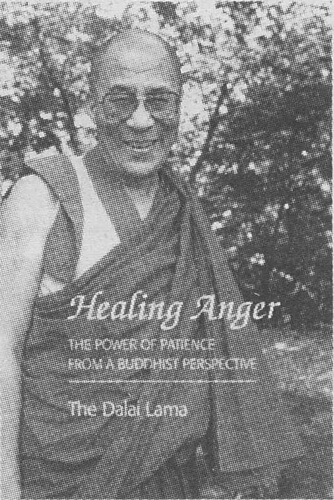| The following article is from the Winter, 1997 issue of the Snow Lion Newsletter and is for historical reference only. You can see this in context of the original newsletter here. |

The Power of Patience from a Buddhist Perspective
by the Dalai Lama
trans, by Thupten Jinpa
155 pp. #HEAN $12.95 March
ξ
In this timely discussion, The Dalai Lama shows the power that patience and tolerance have to heal anger and hatred. As His Holiness points out, this is important in our own lives as well for achieving peace in the world. The techniques and methods presented are relevant not only for Buddhist practitioners but for all who seek to improve themselves.
We think this is a great book.
Here some excerpts from Healing Anger.
Day One
FIRST SESSION
Generally speaking, all the major religions of the world, and particularly Buddhism, emphasize the importance of the practice of love, compassion, and tolerance. This is particularly the case in all the traditions of Buddhism, including Theravada, Mahayana, and Tantrayana (the esoteric tradition of Buddhism). They all state that compassion and love are the foundation of all the paths
In order to enhance one's development of compassion and cultivate the potential for compassion and love inherent within oneself, what is crucial is to counteract their opposing forces. It is in this context that the practice of patience or tolerance becomes very important, because only through patience is one able to overcome the obstacles to patience.
When we talk about patience or tolerance, one should understand that there are many degrees, starting from a simple tolerance, like being able to bear a certain amount of heat and cold, progressing toward the highest level of patience, which is the type of patience and tolerance found in the great practitioners, like the Bodhisattvas on the high levels of the Buddhist path. Since patience or tolerance comes from a certain ability to remain firm and steadfast, to not be overwhelmed by the adverse situations or conditions that one faces, one should not see tolerance or patience as a sign of weakness, or giving in, but rather as a sign of strength coming from a deep ability to remain steadfast and firm. One can generally define patience or tolerance in these terms. We find that even in being able to tolerate a certain degree of physical hardship, like a hot or cold climate, our attitude makes a big difference. Similarly, in the case of those practicing high levels of tolerance and patience, those parallel to the levels of the Bodhisattvas on the path, intelligence also plays a very important role as a complementary factor.
In addition to the value of the practice of tolerance and patience from the Dharma point of view, even in our everyday day-to-day life experiences, tolerance and patience have great benefits, such as being able to sustain and maintain our calmness of mind, peace of mind, and presence of mind. So if an individual possesses this capacity of tolerance and patience, then, even ifthepersonlivesinavery tense environment, one that is very frantic and stressful, the person's calmness of mind and presence of mind will not be disturbed.
When we speak of the deeds of a Bodhisattva, there are three levels. The first is the entry into the Bodhisattva path, which principally involves generating a good heart, the altruistic aspiration to attain full enlightenment for the benefit of all sentient beings. That is the first level of the practice. This is followed by what is known as the actual practice, which consists of the practice of the six perfections. The third level is the activities at the state of Buddhahood, which results from this practice.

One of the factors... that contributes to conflict is our imaginative faculty, or in other words, intelligence. It is also our intelligence which can find means to overcome this conflict.
Compassion can be roughly defined in terms of a state of mind which is nonviolent and nonharming, or nonaggressive. Because of this there is a danger of confusing compassion with attachment and intimacy.
We find that there are two types of love or compassion. On the one hand is compassion or love which is based on attachment or which is tinged by attachment. That type of love or compassion and feeling of intimacy is quite partial and biased, and it is based very much on the consideration that the object of one's affection or attachment is someone who is dear or close to one. On the other hand, genuine compassion is free from such attachment. There the motivation is not so much that this person is dear to me or related to me, or my friend. Rather, genuine compassion is based on the rationale that just as myself, others also have this innate desire to be happy and overcome suffering; just as myself, they have the natural right to fulfill this fundamental aspiration. Based on that recognition of this fundamental equality and commonality, one develops a sense of affinity and closeness, and based on that, one will generate love and compassion. That is genuine compassion.
It is also very clear that the level of intelligence or factor of wisdom that one has as a complementary factor will determine the intensity and the depth of one's compassion. In Buddhism, there are discussions of three principal types of compassion. One is a compassion which is not complemented by any wisdom factors. A second level of compassion is complemented by insight into the transient nature of sentient beings, their impermanent nature. At the third level of compassion, called nonobjectified compassion, the complementary factor is wisdom or insight into the ultimate nature of reality. At this level, one sees the empty nature of sentient beings, and that insight reinforces one's compassionate attitude toward sentient beings.
One of my fundamental beliefs is that not only do we inherently possess this potential or basis for compassion, but also basic human nature or fundamental human nature is gentleness. Not only human beings but all sentient beings have gentleness as their fundamental nature. There are other grounds upon which I base this belief, without having to resort to the doctrine of Buddha-nature. For example, if we look at the pattern of our existence from an early age until our death, we see the way in which we are so fundamentally nurtured by affection, each other's affection, and how we feel when we are exposed to others' affection. In addition, when we ourselves have affectionate feelings or affectionate attitudes, we see how it naturally affects us from within; how we feel ourselves. Not only that, but also being affectionate and being more wholesome in our behavior and thought also seems to be much more suited to the physical structure of our body in terms of its effect on health and physical well-being. Now if this is the case, then it makes all the more sense to try to live a way of life which would be more in accordance with this basic gentle nature of our being.
However, we do find a lot of conflicts and tension, not only within our individual mind, but also within the family, when we interact with other people, and also at the societal level, the national level, the global level, and so on. How do we account for that?
One of the factors, I think, that contributes to this conflict is our imaginative faculty, or in other words, intelligence. It is also our intelligence which can find ways and means to overcome this conflict. So in order to utilize that human intelligence to overcome this conflict, which is created by human intelligence, the important factor is human compassion. I think if we look at the reality, it is quite clear the best way to overcome conflict is the spirit of reconciliation, even within oneself. That spirit has very much to do with compassion.
One aspect of compassion is to respect others' rights, and to respect others' views. That is the basis of reconciliation. I think the human spirit of reconciliation which is based on compassion is working deep down, whether the person really knows it or not. Therefore, because our basic human nature is gentleness, no matter how much we go through violence and many bad things, ultimately, the proper solution is to return to the basic human feeling, that is, human affection. So human affection, or compassion, is not only a religious matter, but in our day-to-day life, it is quite indispensable. ä_æ

